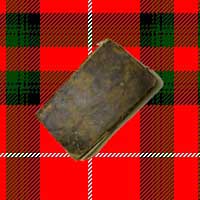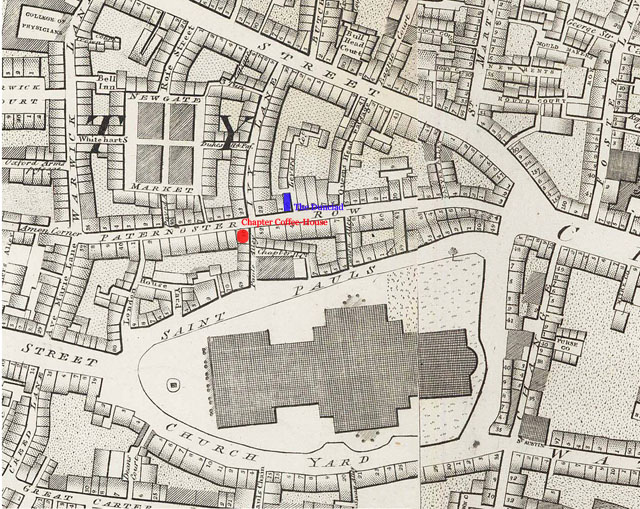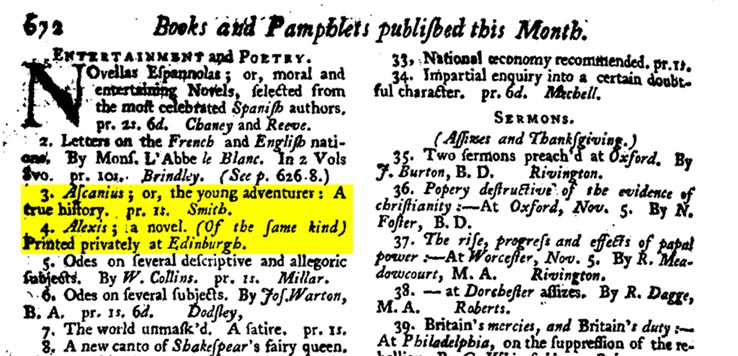
Ascanius; or, the Young Adventurer
Bestselling book of the 18th and 19th centuries
home
Dr. Ralph Griffiths LL.D. |
After Ralph Griffiths' death, his son George Edward Griffiths became the proprietor and editor of the Monthly Review. His editorship lasted from 1803–1825; he was succeeded by Michael Joseph Quinn, who was editor until 1832. The last issue of the Monthly appeared in December 1844. Politically, it was characterized by the liberal, Whiggish, dissenting stance of its founder Griffiths. From May 1825-Apr 1826 the Monthly Review was published by Hurst, Robinson & Co (London) and Archibald Constable & Co (Edinburgh)(probably the same publisher as this version of "Ascanius; or, the Young Adventurer"); from May-Dec 1826, by Charles Knight; from 1827–1828 by Hurst, Chance & Co (with others); and from 1828–1844 by G. Henderson. Reviews from the Monthly have been drawn from the longer reviews in the main body of the periodical, and from the shorter notices contained in the ‘Monthly Catalogue’ section that appeared at the end of each issue. Reviews were published anonymously. However, contributors to the first series (1749-1789) and second series (1790–1825) have been identified by Benjamin Christie Nangle, Associate Professor of English at Yale University, in The Monthly Review, Indexes of Contributors and Articles (Oxford: Clarendon Press, First Series, published 1934 and Second Series, published 1955) using copies of the Monthly Review annotated with the initials of the contributors by Ralph Griffiths himself. For further information, see the entry for ‘Monthly Review by Wilbur T. Albrecht in Alvin Sullivan (ed.), British Literary Magazines: The Augustan Age and the Age of Johnson, 1689–1788, pp. 231–37; see also Derek Roper, Reviewing Before the Edinburgh, and Robert D. Mayo The English Novel in the Magazines On August 25th 1746 (O.S.), Griffiths unsuccessfully petitioned the Duke of Newcastle, then Secretary of State, to release his pamphlets concerning the final testaments of some of the condemned rebels for which he had been arrested. In December 1746 he was under arrest again for "Ascanius; or, the Young Adventurer". Going by the last date of the stock prices on the page before (Novenber 25 to December 23) we can assume the closing date for the magazine to be December 23rd (two days earlier than normal for Xmas) and by the locations of Ascanius and Alexis in the Entertainment and Poetry list (position 3 and 4 of 9) we presume them to be published in the first or second week of December 1746. This time Ralph Griffiths, his printer William Faden, and his publisher William Owen were all examined at Whitehall Cockpit on January 9th, 1746/7 (O.S.) for seditious libel. Griffiths claimed he had, "composed the said Pamphlett from the accounts of the Rebellion published in the London Gazette" which accounts can be found in the Newspapers during the 1745-6 Rebellion. He also said he sent it to the printer about a month ago i.e. around December 9, 1746. Griffiths finally sent a letter to the Duke on January 13th 1746/7 requesting his release "I humbly beg leave to represent to you that I did not intend to give the Government one moment's uneasiness, or, by any means in the least to serve its enemies by publishing Ascanius. I saw, with indignation, a virulent Jacobite Tract called Alexis,in every body's hands. Liking the plan, but abhorring the manner in which it was executed, I determined first to write an Impartial thing of the same kind, after which, knowing that such a work would prejudice all parties in the author's favour, I proposed to serve the Government the more effectually, by exhibiting the young Pretender's Character in another light; and as I had before fairly and like a generous enemy allowed him the few good Qualities he may have, so now to expose all his faults and misconduct: But the execution of this design is at present suspended by my Confinement. However, before I was taken into Custody, I had begun to publish such a History of the late Rebellion, in Small numbers, and under the Title of Ascanius (that it might the more effectually spread itself among all ranks of people) as sufficiently shows my Zeal for my King and Country. In other instances, Sir, I have exerted my poor abilities against the pretender and his party, as many pamphlets of my writing can witness; but never did the least word against his Majesty's person, family, or Government ever fall from my tongue or pen, but many on the other side of the question." Since there are no further actions in this matter we presume he was released some time in January 1746/7 (New Year started on Lady's Day which was March 25th). This won't be the last time Ralph Griffiths is sued November, 1748The first volume of Memoirs of a Woman of Pleasure (Fanny Hill), written by John Cleland (1709-1789), is printed by Thomas Parker and published in London by G. Fenton. The second volume follows in early February 1749. Cleland wrote the story while serving a sentence for debt in Fleet Prison in hopes of selling enough copies to pay off his debts.
March 15, 1749A warrant is issued for the arrest of the author, printer and publisher of Fanny Hill. By the end of the month, Cleland, Parker and Griffiths are free on bail. While awaiting trial Cleland edits out most of the erotic content and in March 1750 the expurgated result is published in one volume as Memoirs of Fanny Hill. Despite heated exchanges of letters between the Secretary of State, the Attorney-General and the Bishop of London, not to mention the groveling letters from Cleland and Ralph Griffiths blaming everything on G. Fenton [Fenton Griffiths, pseudonym for Ralph Griffiths], it appears the case is never pursued. |

